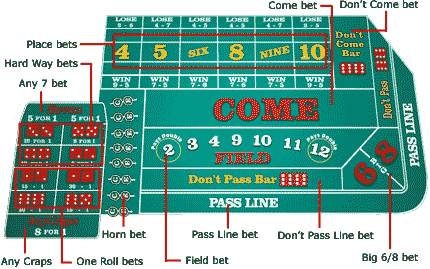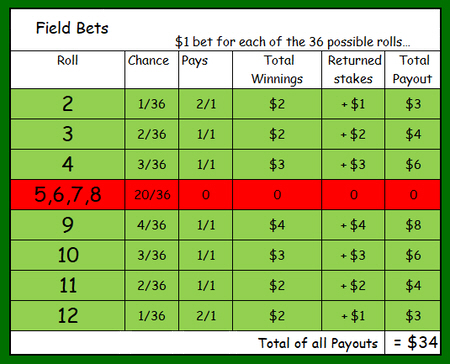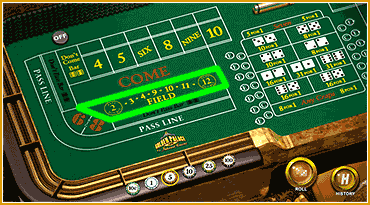Odds Craps Field Bet
Field Bet Payout Options. The actual odds of the Field bet are 5 to 4, which is exactly why players are pretty much fond of this kind of craps bet. The payouts for the Field bet are even in case that the numbers 3, 4, 9, 10 or 11 come out after the shooter's roll. On the other hand, the payouts are 2 to 1 when the shooter rolls a 2 or a 12. The field bet is another one of the most common and popular craps bets. It also has fairly good odds as well so players could benefit from this bet. Basically, all you are betting on is that the shooter will roll a 2, 3, 4, 9, 10, 11 or 12. The player wins the bet if the dice lands on any of these numbers. Bets with Poor Craps Odds Big 6/Big 8 Bet. This is a Bet on a Big 6 or Big 8, put down after the point has been established. If a 6 or 8 is rolled before a 7, you win (1:1). This is a bet that you should not play because you can Place a bet on 6 or 8 and receive better odds.
The Craps Mini Field-Place System Tested
by Steve “Heavy” Haltom
Regardless of the fact that no system out there will beat a negative expectation game over the long run, articles about betting systems and strategies seem to get far more positive comments from readers than any other articles we publish. For that reason, in this article we’re going to focus on none other than with the infamous Field-Place System. Sold in magazines, bookstores, and on-line under dozens of different names for sixty years or more, the Field-Place System is one of the oldest strategies around. These days a popular variant is called the Iron Cross. Barstow used to call a similar strategy the Treadmill, which in itself should tell you what he thought of it. It’s been marketed as the 87% System, the Anything but Sevens System, the Fremont Street Grind, and under at least a dozen more names – many of which I won’t mention here because they were the names the players came up with for this play after investing hundreds of dollars in it and losing thousands more.
The play itself is relatively simple. Most of you are well acquainted with it. You make Place bets on the Five, Six, and Eight plus a bet in the Field. The Field bet covers the Two, Three, Four, Nine, Ten, Eleven, and Twelve. You’ll sometimes see urban players running a similar strategy using the Big 6-8 bet instead of Place betting the Six and Eight. These guys like the “self-service” bets like the Big 6-8 and the Field and play more of an intuitive game than most of us. Irregardless, the idea is to cover every number on the dice except the Seven. It’s better to make two unit bets on the place action and one unit bets in the Field but you can play it at the one unit level, which is what we’re talking about here when we discuss the “Mini Field-Place System.” You risk four units total and you are guaranteed some sort of a win (or a push on the urban version assuming the player also places the five) on every toss – unless that Seven shows. For players who first “discover” this system it’s often some sort of a “Eureka!” moment. They believe they’ve found the Dutchman’s Lost Mine. Then they take it to the table and learn the truth about Fool’s Gold.
How do the payouts work in this play? Let’s assume a $5 game that pays double on the Two and triple on the Twelve in the Field. You’ll have to wager $6 each on the Six and Eight Place bets but can get by with $5 on the Five and in the Field, so your total wager will be $22. Now, you could take that same $22 and bet $22 inside, but you’d only get paid if an inside number rolled. Remember, the Field-Place System, which we’re playing at the table minimum, gets you paid on every decision unless the seven rolls. Here are the payouts:
Two Rolls – Pays $10 in the Field
Three Rolls – Pays $5 in the Field
Four Rolls – Pays $5 in the Field
Five Rolls – Lose the $5 Field bet – win $7 for the Place bet – Net Win $2
Six rolls – Lose the $5 Field Bet – win $7 for the Place bet – Net Win $2
Eight rolls – Lose the $5 Field Bet – win $7 for the Place bet – Net Win $2
Nine Rolls – Pays $5 in the Field
Ten Rolls – Pays $5 in the Field
Eleven Rolls – Pays $5 in the Field
Twelve Rolls – Pays $15 in the Field
So far the math looks great on this system. It’s all win win win – pay pay pay. Of course, on your two strongest numbers – the Six and the Eight – your wins are diluted by your loss in the Field. The loss on the win on the Five Place bet in the Field also dilutes the win there. Those diluted payoffs – combined with the frequency at which the Seven rolls in relation to the other numbers – turn this into a negative expectation strategy. On average, for every 36 rolls of the dice you’ll win $123, but you’ll also lose $132. That’s a $9 loss over 36 rolls, or .25 cents a roll for those of you who are struggling with Common Core math.
Of course, what the system player is looking for is enough variance in the game to put him ahead so that he can walk away with a win. He may approach the game with a number in mind – say to win $150. But to get the kind of variance he needs on a dollar per dollar basis he can’t rely on volatility alone. So he has to increase his bet size. Instead of betting $5 on the Five and $6 on the Six and Eight he tests out different amounts. Say $50 on the Five, $60 on the Six and Eight and $25 in the Field. The logic is that he’s always assured of getting green chips in his payout so he’ll reach that $150 win objective quicker. The problem is that variance is a two-edged sword. To front that sort of average bet he needs a session bankroll of $1500 instead of $150. The stack of quarters extracted from every decision adds up quickly. And don’t forget – you only WIN one bet at a time. When the Seven shows ALL of those bets lose. I recall standing next to a guy who was playing the system at this level once. He was loudly bragging to everyone at the table how great it was as he locked up a full rail of green chips. Then he started to get quiet as the chips began to migrate back to the other side of the table. In the end he gave it all back plus what he bought in for – and went back to the ATM for a bankroll infusion and re-buy. He had the volatility he needed. He just didn’t have the discipline to quit while he was ahead.
Craps Field Bet Strategy
Out of curiosity, I noodled around and found an archival test of the Field-Place System against the 72 Hours at the Casino book. Admittedly, the 14,967 rolls in that book have a slight dark-side bias, so it was obvious that the system would fare worse than in the statistical example cited above. It was even worse than I expected. The total win was $50,969. The total loss was $56,628. The net loss was $5,659.
72 hours at the casino. 72 of the most miserable hours of your life. It works out to about 36 two hour sessions or 18 four hour sessions. Hell, there was a time when I played that much in a single weekend. These days it might take me a month to get in that much play. Still, do you have an extra $5,659 to lose making $5 minimum bets?
Neither do I. And now you know why I hate this play.
Do yourself a favor. Just say no to this sort of thing and learn to beat the game by influencing the dice and betting the dice right.
Related Articles
There are many different bets you can make on the craps table. This often confuses new players but in actual fact craps is not that complicated. In this section we outline all of the possible betting options and show you where those bets go on the table.
The Craps Table
Below is an example of a craps table. The image shows a half table layout as seen on the Microgaming online craps game. Tables at other casinos might look slightly different but the layouts are very similar.
The Different Bets
Pass Line
The most common craps bet. The Pass Line bet is made on the come out roll and wins if a 7 or 11 is rolled. If a 2, 3 or 12 is rolled the bet loses. If any other number is rolled the point is established. If the point is rolled before a 7 the bet wins. If a 7 is rolled the bet loses. Pays even money.
Pass Line Odds
Also known as 'Taking the Odds', the Pass Line Odds bet is an extra bet that can be made after a Pass Line bet is made and the point is established. In most cases this can be a multiple of your Pass Line bet. The bet wins if the point is rolled before a 7. This is one of the few best in the casino that has no house edge. The point determines the pay out with the most common being 2 to 1 (4 or 10), 3 to 2 (5 or 9) and 6 to 5 (6 or 8).
Don't Pass Line
Craps Betting Strategy
The opposite bet to the Pass Line Bet. The Don't Pass bet wins if the come out roll is a 2 or 3 and loses if the come out roll is a 7 or 11. If a 12 is rolled this is a push. In the case of a push or if the point is established the dice continue to be rolled until either a 7 or the point is rolled. The bet wins if a 7 is rolled and loses if the point is roll. Wins pay even money.


Don't Pass Odds
Also known as 'Laying The Odds', this be is the opposite to Taking the Odds and wins if a 7 is rolled before the point. In most cases this bet can be a multiple of your Don't Pass bet. The pay out depends on the point with the most common being 1 to 2 (4 or 10), 2 to 3 (5 or 9) and 5 to 6 (6 or 8).
Come
The same as the Pass Line Bet with the exception that it can be made at any time after the point is established. The bet wins if a 7 or 11 is rolled and lose if a 2, 3 or 12 is rolled. If any other number is rolled this becomes your point. You win if your point is rolled before a 7. Pays even money.
Don't Come
The opposite of the Come bet and can be made at any time after the point is established. Wins if a 2 or 3 is rolled and loses if a 7 or 11 is rolled. If a 12 is rolled the bet pushes. If a point is established you win if a 7 is rolled before your point. Pays even money.
Place Bets
A bet made on 4, 5, 6, 8, 9 or 10 that can be made at any time. Wins if the number is rolled before a 7. This bet is the same as the odds bets but with lower pay outs. The standard pay outs are as follows 9 to 5 (4 or 10), 7 to 5 (5 or 9) and 7 to 6 (6 to 8)
Place Bets To Lose
A relatively rare betting option found at some land based casinos but quite common online. This bet is the opposite of the Place Bets. The bet can be made at any time and wins if a 7 is rolled before your number. Pay off are usually 5 to 11 (4 or 10), 5 to 8 (5 or 9), 4 to 5 (6 or 8).
Buy Bets
These bets are similar to the Place Bets with different pay offs. A Buy Bet can be placed at any time on any of the points. This bet wins if the point is rolled before a 7. Pay offs are the same as the odds but casinos take a 5% vig on the bet. Wins pay 2 to 1 (4 or 10), 3 to 2 (5 or 9) and 6 to 5 (6 or 8).
Lay Bets
The opposite to the Buy Bet. A Lay Bet can be placed on any point and wins if a 7 is rolled before the point. Due to the fact that a 7 being rolled is more likely the casinos take a 5% commission on the amount that can be won. Pay off are 1 to 2 (4 or 10), 2 to 3 (5 or 9) and 5 to 6 (6 or 8).
Big 6 and 8
A bet on Big 6 or Big 8 wins if a 6 or an 8 is rolled before a 7. These bets pay even money and should be avoided as you can make the same bet on the Place 6 or 8 and get better pay offs.


Field Bet
The Field betting areas is a big section on the craps table. A bet placed on the field wins if the next roll is a 2, 3, 4, 9, 10 or 11. If the next roll is a 3, 4, 9 or 11 you win even money. If a 2 or a 12 is rolled you win 2 to 1.
Hardways
There are four possible hardways bets (2-2, 3-3, 4-4 and 5-5). Hardways bets can be made at any time and win if the selected hardway rolls before a 7. The bet loses if a 7 is rolled or if the total is rolled with a different combination. Hardways 6 and 8 pay 9 to 1. Hardways 4 and 10 pay 7 to 1.
Any 7
Wins if a 7 is rolled and loses if any other number is rolled. Pays 4 to 1.
Any Craps
Wins is a 2, 3 or 12 is rolled and loses on any other number . Pays 7 to 1
Two Craps or Aces
Also known as Snake Eyes. Wins if a 2 is rolled and pays 30 to 1.
Playing The Field Craps
Twelve Craps or Two Sixes
Wins if a 12 is rolled and loses on all other numbers. Pays 30 to 1
Three Craps or Ace Deuce
Wins if a 3 is rolled and loses on all other rolls. Pays 15 to 1
Eleven or Six Five
Wins if 11 is rolled and loses on all other rolls. Pays 15 to 1
Horn Bet
The Horn Bet is actually four bets in one. You are placing one betting unit on 2, 3, 11 and 12. If 3 or 11 is rolled wins pay 3.75 to 1. If 2 or 12 is rolled wins pay 7.5 to 1. Any other number rolled and the bet loses.